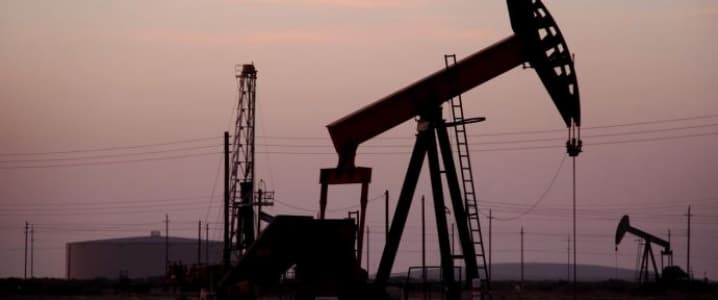In the 1990s, the California-based Unocal Corporation invited a delegation from the Afghan Taliban to their headquarters in Sugar Land, Texas, to discuss prospects for constructing a 1700-kilometer Peace Pipeline, according to a new documentary by Al-Jazeera called “Taliban Oil.”
If the pipeline had been completed, it would have connected the Caspian Sea’s fossil fuel resources through Turkmenistan to Afghanistan, Pakistan and India at a cost of $10 billion, and resulted in friendship with the Taliban.
The documentary’s findings reveal an until-now hidden opportunity in Afghani oil and gas reserves to rebuild the country destroyed by decades of war—data gleaned from seismic surveys conducted by Soviet and U.S. engineers in the 1990s has been kept secret for years by a small and neglected office of the Afghani government.
Afghani oil interests, pedaled by the Taliban, have embroiled the country in a conflict with the United States over the fate of Al-Qaeda in the past.
When officials from the Taliban first began discussing the line with American oil executives in the early 1990s, their main goals encompassed the reconstruction of Afghanistan using the funds that the transportation of oil through the pipeline would generate, Wakil Ahmad Muttawakil, the former Taliban foreign secretary, said in the film.
The pipeline would have doubled the Afghani government’s revenues at the time by adding $400 million a year to its budget, but geopolitics plagued the region, preventing the transnational pipeline from being built and protected.
“The whole area was in turmoil,” Marty Miller, the former Vice President of Unocal, said in the documentary. “The Afghans don’t like Pakistan. The Pakistanis don’t like the Afghans. Turkmen’s are skeptical of both of ’em. It was just a mess in there.”
The Soviet withdrawal from Afghanistan in 1989 had left a power vacuum in the region that pit warlords against each other to gain regional authority.
The Afghan Northern Alliance, a group that later allied with U.S. forces in the fight against the Taliban, maintained control over the country’s northern regions.
The Taliban – backed by Pakistani interests that supplied arms, training and fighters – controlled the southern and eastern portions of the country. Related: Oil Prices Under Fire From Rogue OPEC Members
“The Pakistanis were trying to enforce their will on the future of Afghanistan to ensure that Afghanistan was not going to be a strong viable nation state that could in anyway reconnect, as they have in the past with India,” Thomas Gouttierre, a leading U.S. expert on Afghanistan, said to Al-Jazeera.
In December 1997, the Taliban’s delegation reached Sugar Land to meet Miller and his associates and understand the financial commitments it would take for the pipeline and Afghanistan’s energy industry to succeed.
“They were very interested,” Miller said of the encounter.
But the pipeline required the end of hostilities between rival insurgent groups in Afghanistan to ensure investors would be comfortable with the massive cash infusions needed to fund the project.
Julie Sirrs, a former officer at the Defense Intelligence Agency, confirmed that the pipeline had been slated to improve Afghanistan’s economic stability, though she felt uncomfortable with the group’s stance on women’s rights and other humanitarian issues.
At the end of the Taliban’s visit to the United States in 1997, the Afghans visited senior-level officials from the U.S. State Department, the documentary said.
President Bill Clinton had been intrigued with the energy resources found in the region and encouraged his administration to work with the oil companies involved in a “professional” manner to the make the pipeline project possible, according to Miller.
Deceased Al-Qaeda leader Osama Bin Laden’s entered the pipeline story later on, when Unocal set up its office for the training of local Afghan workers for the project on the same street as Bin Laden’s home.
Miller, who did not know of the office’s proximity to Bin Laden at the time, said the location gives him “the creeps” when he thinks about it today.
After Al-Qaeda attacked the U.S. embassies in Nairobi, Kenya and Dar es Salaam, Tanzania on 7 August, 1998, the American government began asking the Taliban, which ruled the majority of the country at the time, about Bin Laden’s whereabouts. Related: The Coming Oil Price Crash
Cultural norms, which push Afghans to be loyal hosts to their guests, prevented the Taliban’s officials from revealing the Al-Qaeda leader’s location to the U.S. forces, angering the Americans and fueling desires to invade Afghanistan to retrieve bin Laden.
In 2001, after a final meeting in Berlin with the Taliban and relevant regional players, American forces made their intentions of invading Afghanistan in the fall known to their allies. When Al-Qaeda heard of the plan, they decided to preemptively strike the U.S. in the attacks now known as 9/11, the film said.
ADVERTISEMENT
“My reaction to 9/11 was that it would be very destructive for Afghanistan, that’s why the Taliban would not have allowed it,” a Taliban source from the firm said. “It would be better if this hadn’t happened.”
Data on Afghanistan’s oil and gas resources can still be retrieved from old Soviet-era offices in the city of Mazar-e-Sharif, where Chief Engineer Mohammed Jan Akhtari protects them from government infighting.
“No one even knows what’s here,” Akhtari told Aljazeera, hoping for a new era of Afghani politics ready for national reconstruction. “It’s a treasure for our nation and someday it will be needed.”
Though Afghanistan’s oil and gas transport and production has been stalled due to the nation’s instability, Akhtari believes that once the country is ready to harvest its natural resources, fossil fuels will rebuild his lost nation.
With limited funds and poor health, he systemizes valuable surveys on Afghani oil and gas reserves conducted by international experts.
“I do it for the future generations,” Akhtari says.
By Zainab Calcuttawala for Oilprice.com
More Top Reads From Oilprice.com:
- IEA Pours Cold Water On Oil Price Rally
- Is 2016 The Turning Point For Energy Storage?
- Does The U.S. Really Have More Oil Reserves Than Saudi Arabia?


















